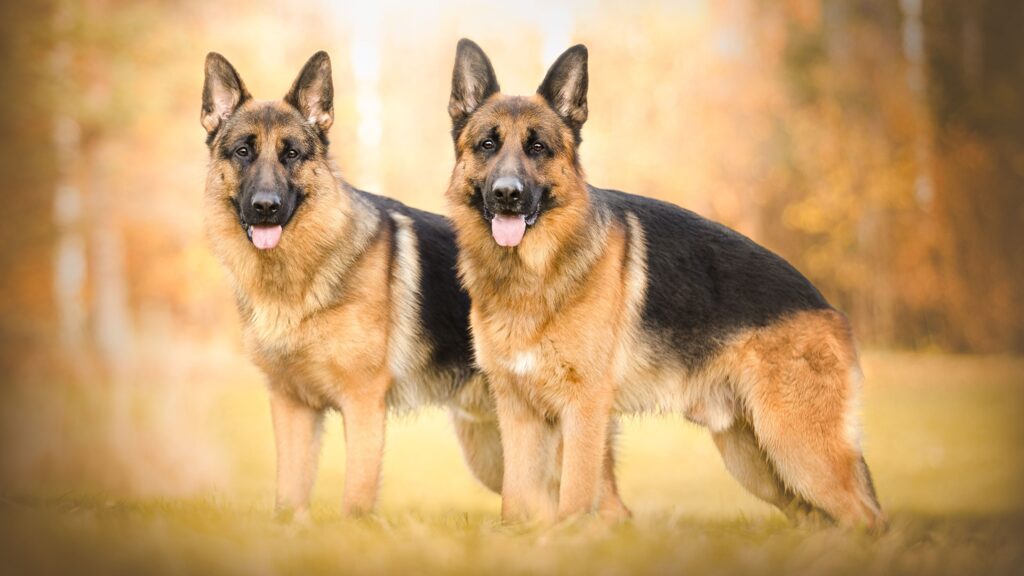
With its striking appearance, unwavering loyalty, and remarkable intelligence, the German Shepherd has rightfully earned its place as one of the most beloved dog breeds in the world. Originally bred in Germany in the late 19th century, this versatile and capable breed has since made its mark across the globe. In this article, we’ll delve into the fascinating history, distinctive characteristics, and enduring appeal of the German Shepherd, showcasing why it continues to be a cherished and respected breed.
A Rich History and Purposeful Origins
The history of the German Shepherd is deeply rooted in its purposeful origins, as it was carefully bred with specific traits and characteristics in mind. The breed’s development can be traced back to the late 19th century in Germany, where it was created by a German cavalry officer named Captain Max von Stephanitz.
- Shepherd Dogs of the Past: In the 1800s, Germany was primarily an agrarian society, and there was a need for reliable and capable herding dogs to manage and protect livestock, particularly sheep. Local shepherd dogs were used for this purpose, but they varied greatly in appearance and abilities.
- Captain Max von Stephanitz and the Founding of the Breed: In 1899, at a dog show in Karlsruhe, Captain Max von Stephanitz encountered a dog named Hektor Linksrhein. He was immediately impressed by the dog’s intelligence, strength, and overall utility as a working dog. Recognizing the potential to create a standardized and versatile herding breed, he purchased Hektor and renamed him Horand von Grafrath. This marked the official foundation of the German Shepherd breed.
- The First Registered German Shepherd: On April 22, 1899, Captain Max von Stephanitz founded the Verein für Deutsche Schäferhunde (Society for the German Shepherd Dog), also known as SV. This organization was dedicated to promoting and developing the breed. Horand became the first dog registered in the SV’s breed registry, and all subsequent German Shepherds can trace their lineage back to him.
- Focus on Utility and Versatility: Captain von Stephanitz emphasized the importance of breeding German Shepherds for their working abilities rather than just their appearance. He aimed to create a breed that possessed intelligence, trainability, strength, and loyalty – qualities that would make them exceptional herding dogs and versatile working dogs.
- World War I and Rise to Popularity: During World War I, German Shepherds served as messenger dogs, ambulance dogs, and guard dogs for the military. Their loyalty, intelligence, and bravery under fire gained them international recognition, and after the war, the breed’s popularity soared worldwide.
- Continued Adaptation and Specialization: In the following decades, German Shepherds continued to prove their worth in various roles, including police work, search and rescue missions, and as service dogs. Their exceptional abilities and trainability made them a top choice for law enforcement agencies around the globe.
Intelligence and Trainability
Intelligence and trainability are two of the most prominent and sought-after traits of the German Shepherd breed. These qualities have played a significant role in their success as working dogs in various fields and as beloved companions for families. Let’s explore the intelligence and trainability of German Shepherds in more detail:
- High Intelligence: German Shepherds are widely regarded as one of the most intelligent dog breeds. Their keen intellect is a product of their purposeful breeding for utility and their ability to learn and adapt quickly to new situations. This intelligence is often evident in their problem-solving skills and ability to make decisions independently, which makes them valuable in challenging and dynamic environments.
- Quick Learners: German Shepherds are fast learners and have an exceptional memory. This means that they can quickly pick up on commands, routines, and training cues. Consistency in training is key to reinforcing positive behaviors and building a strong bond with the dog.
- Versatile and Adaptable: Their intelligence and adaptability make German Shepherds ideal for a wide range of tasks and roles. Whether it’s herding livestock, working in law enforcement, participating in search and rescue missions, or performing as service dogs, they excel in various fields due to their ability to understand complex tasks and follow instructions.
- Problem-Solving Skills: German Shepherds possess an innate curiosity and the ability to think critically, which enables them to solve problems and overcome challenges. This quality is particularly valuable in working situations, where they may encounter unexpected obstacles that require independent decision-making.
- Trainability: German Shepherds have a strong desire to please their owners, which, combined with their intelligence, makes them highly trainable. They thrive in environments where they receive positive reinforcement and rewards for good behavior. Harsh training methods or negative reinforcement can be counterproductive and may lead to behavioral issues.
- Obedience and Commands: Their trainability allows German Shepherds to excel in obedience training. They can master a wide range of commands, including basic obedience cues like sit, stay, come, and heel, as well as more advanced commands for specialized tasks.
- Bond with Handlers: German Shepherds form deep bonds with their handlers, which fosters trust and enhances their willingness to follow commands. This strong attachment makes them reliable partners and loyal companions.
Loyal and Protective Companions
German Shepherds are renowned for their unwavering loyalty and protective nature, making them exceptional companions for individuals and families alike. Their unique combination of intelligence, loyalty, and courage has earned them a reputation as one of the most reliable and dependable breeds. Let’s delve deeper into why German Shepherds are known for being loyal and protective companions:
- Strong Bond with Their Owners: German Shepherds have a natural inclination to form strong bonds with their human family members. Once they establish this bond, they are fiercely devoted to their owners and will go to great lengths to protect and please them. This loyalty is at the core of their nature and is a trait that has been carefully preserved through generations of breeding.
- Protective Instincts: As descendants of herding dogs, German Shepherds have an innate instinct to protect and guard their family and territory. This protective nature is further enhanced by their intelligence and ability to assess potential threats. When they sense that their family is in danger or uncomfortable situations, they can quickly switch into a protective mode.
- Excellent Watchdogs: German Shepherds make excellent watchdogs due to their keen senses and heightened awareness of their surroundings. They are vigilant and attentive, always alert to any unusual sounds or movements. Their loud and commanding bark can act as a deterrent to potential intruders.
- Reliable Guardians: Beyond being watchdogs, German Shepherds are trustworthy guardians. When properly trained and socialized, they can distinguish between friend and foe. Their loyalty extends to protecting not just their human family members but also other pets in the household.
- Family-Oriented: German Shepherds often form strong bonds with all members of the family, including children. They are known to be patient and gentle with kids, making them excellent family dogs when raised with proper socialization and training.
- Calm Under Pressure: Despite their protective nature, well-trained German Shepherds can exhibit self-control and remain composed even in stressful situations. Their ability to stay calm under pressure is a testament to their intelligence and training.
- Socialization and Training: It is essential to note that loyalty and protectiveness in German Shepherds should be nurtured through early socialization and consistent training. Proper exposure to various people, environments, and experiences helps develop a well-rounded and confident dog.
Versatile Working Dogs
German Shepherds are renowned as versatile working dogs, and their remarkable set of skills and traits enable them to excel in a wide range of roles and tasks. Their history as a herding breed and their carefully cultivated intelligence and trainability have made them invaluable assets in various fields. Here are some of the key aspects that showcase the German Shepherd’s versatility as working dogs:
- Herding and Livestock Management: Originally bred as herding dogs, German Shepherds possess natural herding instincts and excel at managing and protecting livestock. Their ability to command and guide animals with ease makes them indispensable assets on farms and ranches.
- Police and Military Work: German Shepherds are a top choice for police and military work around the world. Their intelligence, trainability, and strong work ethic make them ideal for roles such as tracking suspects, searching for drugs or explosives, and apprehending criminals. Their protective nature also makes them excellent K9 officers, as they can fearlessly and decisively protect their human partners.
- Search and Rescue (SAR) Operations: German Shepherds have an exceptional sense of smell and a natural talent for tracking scents. These qualities make them highly effective search and rescue dogs. They are often deployed to locate missing persons in various terrains, including wilderness areas and disaster sites.
- Service Dogs: Due to their intelligence and ability to learn complex tasks, German Shepherds are widely used as service dogs for individuals with disabilities. They can be trained to perform a multitude of tasks, such as guiding the visually impaired, assisting people with mobility challenges, and providing emotional support to those with mental health conditions.
- Therapy Dogs: German Shepherds’ gentle and empathetic nature allows them to excel as therapy dogs. They provide comfort and companionship to individuals in hospitals, nursing homes, and other care facilities, offering emotional support and improving the well-being of those they interact with.
- Agility and Sports: The German Shepherd’s athleticism and eagerness to please also make them excellent contenders in dog sports, such as agility competitions and obedience trials. Their versatility in various canine sports showcases their adaptability and love for mental and physical challenges.
- Family Companions: Beyond their exceptional working abilities, German Shepherds also make loyal and loving family pets. Their protective instincts, intelligence, and affectionate nature make them wonderful companions for households that can provide them with the attention, training, and exercise they need.
Physical Attributes and Iconic Looks:
German Shepherds possess a distinctive and iconic appearance that immediately commands attention and respect. Their physical attributes not only contribute to their imposing presence but also serve practical purposes in various working roles. Let’s explore the key physical characteristics that make German Shepherds stand out:
- Sturdy and Muscular Build: German Shepherds are well-proportioned and have a sturdy, medium-to-large build. They are strong and athletic, with well-developed muscles that provide them with agility and endurance. This physique is a reflection of their history as working dogs, designed to perform physically demanding tasks.
- Double Coat and Colors: One of the most recognizable features of German Shepherds is their double coat. The outer coat is dense, harsh, and weather-resistant, providing protection from the elements and minor injuries. Beneath the outer coat lies a thick, softer undercoat that helps regulate body temperature. Common coat colors include black with tan or red markings, sable (a mix of black and tan hairs), or all-black. White German Shepherds exist, but they are considered a separate color variation and are not accepted in some breed standards.
- Erect Ears: German Shepherds typically have large, upright ears that are pointed and highly mobile. These ears not only contribute to their alert and attentive expression but also serve a functional purpose by enhancing their ability to hear and locate sounds in various working environments.
- Intelligent and Alert Eyes: Their eyes are medium-sized, almond-shaped, and dark in color. The intelligent and alert expression in their eyes reflects their high level of intelligence and attentiveness. Their keen gaze is one of the reasons they are so effective as watchdogs and working dogs.
- Elegant Gait: German Shepherds have a smooth and fluid gait that exudes confidence and power. Their movement is efficient and effortless, allowing them to cover ground quickly and efficiently when needed.
- Tail: The tail of a German Shepherd is bushy and typically hangs down when at rest. When excited or in motion, their tail may be raised, but it should never curl over the back. The tail is an extension of their spine and provides balance and stability during movement.
- Size and Proportions: Male German Shepherds typically stand between 24 to 26 inches (60 to 65 cm) at the shoulder and weigh between 65 to 90 pounds (30 to 40 kg). Females are slightly smaller, usually measuring between 22 to 24 inches (55 to 60 cm) and weighing between 50 to 70 pounds (22 to 32 kg).
A Family-Friendly Breed:
German Shepherds, despite their reputation as working dogs, can be wonderful family-friendly companions when raised in a loving and caring environment. Their loyalty, intelligence, and protective nature extend to their human family members, making them excellent choices for households with the right dedication and commitment to training and socialization. Here are some reasons why German Shepherds can be great family pets:
- Loyal and Devoted: German Shepherds form strong bonds with their owners and families. Once they establish this connection, they are fiercely loyal and devoted, always seeking to please and protect their loved ones. This loyalty ensures that they will be dedicated family members who are always there for their human pack.
- Gentle and Patient: When properly trained and socialized, German Shepherds are gentle and patient with children. They have a natural instinct to protect, which often extends to the youngest members of the family. Supervised interactions and early socialization help ensure a harmonious relationship between the dog and children.
- Protective Instincts: While their protective nature is a valuable asset, it’s essential to strike a balance and ensure that they understand the difference between normal family interactions and genuine threats. Proper training and socialization will help channel their protective instincts appropriately.
- Playful and Energetic: German Shepherds have boundless energy and enjoy interactive playtime with their family members. Engaging in physical activities like fetch, running, and obedience training can help keep them mentally stimulated and physically satisfied.
- Training and Obedience: The intelligence and trainability of German Shepherds make them responsive to obedience training. They thrive in an environment where they receive positive reinforcement and clear guidance from their owners. Training not only establishes boundaries but also strengthens the bond between the dog and the family.
- Versatility in Family Life: German Shepherds adapt well to various family dynamics, whether they live in a single-family home or an apartment (provided they get sufficient exercise). They are adaptable and can integrate into different lifestyles, as long as their needs for mental and physical stimulation are met.
- Watchful and Alert: Their watchful and alert nature makes German Shepherds excellent watchdogs. They will let you know if something unusual is happening around the house, offering an extra layer of security for the family.
Conclusion:
In conclusion, the German Shepherd is much more than a beautiful and imposing breed; it is a testament to the incredible bond between humans and dogs. From their humble origins as herding dogs to their versatile roles in modern society, German Shepherds have consistently proven themselves to be loyal, intelligent, and indispensable companions. As we continue to forge lasting relationships with these remarkable canines, one thing remains certain – the German Shepherd’s legacy as a timeless and cherished breed will endure for generations to come.
 Shepadoodle: A Perfect Blend of German Shepherd and Poodle Traits
Shepadoodle: A Perfect Blend of German Shepherd and Poodle Traits Chihuahua Shepherd: Discover the Unique Mix of German Shepherd and Chihuahua
Chihuahua Shepherd: Discover the Unique Mix of German Shepherd and Chihuahua Beagle Shepherd: The Perfect Blend of German Shepherd and Beagle
Beagle Shepherd: The Perfect Blend of German Shepherd and Beagle Pomeranian Shepherd: A Unique German Shepherd x Pomeranian Mix
Pomeranian Shepherd: A Unique German Shepherd x Pomeranian Mix The Dachshund Shepherd: Unleashing the Playful Spirit of Two Iconic Breeds
The Dachshund Shepherd: Unleashing the Playful Spirit of Two Iconic Breeds